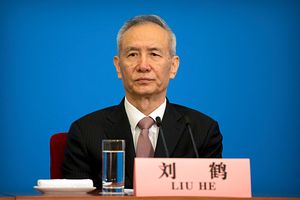A Chinese trade delegation, led by Liu He — Chinese President Xi Jinping’s special envoy and vice premier — arrived in Washington, D.C. on May 15 for the second round of trade talks with their U.S. counterparts. The Chinese foreign ministry stated earlier that Liu will stay for five days, from May 15 to 19.
This new round of talks is expected to be tough for both sides.
Two weeks ago, the U.S. trade delegation wrapped up the first round of talks in Beijing, which, according to China’s state news agency Xinhua, ended in a “candid, efficient and constructive” way. An anonymous Chinese government source explained to the South China Morning Post that: “Candid means there was a heated exchange. Efficient means the talks were very short. And constructive means there’s still a huge gulf between the two sides.”
On May 16, the White House announced that the Chinese delegation will have meetings with U.S. Treasury Secretary Steven Mnuchin, Commerce Secretary Wilbur Ross, and U.S. Trade Representative (USTR) Robert Lighthizer, along with additional senior administration officials, at the Department of the Treasury from May 17 to 18.
While the whole world is focusing its attention on this upcoming negotiation, Beijing has purposefully remained low-key domestically.
Xinhua so far has only briefly reported about Liu’s arrival by listing the full members of Chinese delegation, which includes Governor of the People’s Bank of China Yi Gang, Vice Chairman of the National Development and Reform Commission Ning Jizhe, Deputy Director of the Office of the Central Commission for Financial and Economic Affairs Liao Min, and a host of vice ministers from various departments.
Xinhua also briefly mentioned that a Chinese working group had arrived in the United States last week and “engaged in intense consultations with the U.S. side” before the arrival of Liu’s delegation. Yet this report was not posted to the homepage of Xinhua’s website.
Besides these short pieces, there was hardly any other information on the visit published by Chinese state media.
This intentionally low profile signals thoughtful consideration on the part of Beijing.
On the one hand, Beijing does have a strong intention of reaching a deal with Washington this time. It’s worth mentioning that Beijing sent two new faces — Luo Wen and Han Jun, representing the Industry and Information Technology Ministry and the Agriculture and Rural Affairs Ministry, respectively — to the negotiation table. It is an obvious attempt by Beijing to make some breakthroughs on both agriculture and information technology — the two hottest and most debated sectors in the U.S.-China trade talks.
In addition, Shawn Donnan, a world trade editor of Financial Times, said on Twitter that Liu met with Henry Kissinger ahead of his official meeting with his U.S. counterpart on May 16. Kissinger has been regarded by Beijing as a supreme China policy guru in the United States as well as China’s old friend for decades. If Donnan’s information is correct, Liu’s meeting with Kissinger demonstrated again that Beijing is trying all means to lobby for a good outcome.
On the other hand, Beijing is still highly uncertain about the final result. U.S. President Donald Trump so far has been the most unpredictable factor in the whole game. Days ago, Trump announced on his Twitter account that he and Chinese President Xi Jinping are working together to give ZTE, a major Chinese technology company, a way to “get back into business fast” after a U.S. order to halt the supply of U.S. components to the firm. Trump said that the “Commerce Department has been instructed to get it done.”
On May 16, however, Trump changed his tone by tweeting that “Nothing has happened with ZTE except as it pertains to the larger trade deal.”
“China has much to give!” he added.
Under these circumstances, to remain low key domestically about Liu’s current visit seems to be a smart and necessary tactic for Beijing. That way, if Liu’s delegation fails to strikes a deal with Washington, Beijing can control the information more easily.

































